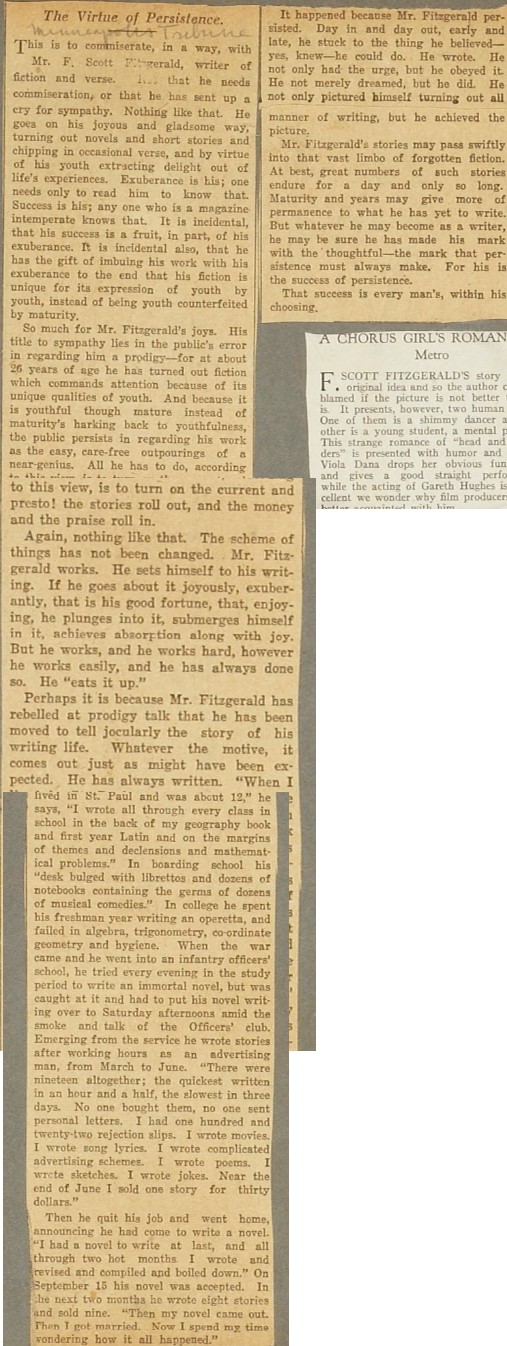
The Virtue of Persistence
This is to commiserate, in a way, with Mr. F. Scott Fitzgerald, writer of fiction and verse. Not that he needs commiseration, or that he has sent up a cry for sympathy. Nothing like that. He goes on his joyous and gladsome way, turning out novels and short stories and chipping in occasional verse, and by virtue of his youth extracting delight out of life's experiences. Exuberance is his; one needs only to read him to know that. Success is his; any one who is a magazine intemperate knows that. It is incidental, that his success is a fruit, in part, of his exuberance. It is incidental also, that he has the gift of imbuing his work with his exuberance to the end that his fiction is unique for its expression of youth by youth, instead of being youth counterfeited by maturity.
So much for Mr. Fitzgerald's joys. His title to sympathy lies in the public's error in regarding him a prodigy—for at about 26 years of age he has turned out fiction which commands attention because of its unique qualities of youth. And because it is youthful though mature instead of maturity's harking back to youthfulness, the public persists in regarding his work as the easy, care-free outpourings of a near-genius. All he has to do, according to this view, is to turn on the current and presto! the stories roll out, and the money and the praise roll in.
Again, nothing like that. The scheme of things has not been changed. Mr. Fitzgerald works. He sets himself to his writing. If he goe3 about it joyously, exuberantly, that is his good fortune, that, enjoying, he plunges into it, submerges himself in it, achieves absorption along with joy. But he works, and he works hard, however he works easily, and he has always done so. He “eats it up.”
Perhaps it is because Mr. Fitzgerald has rebelled at prodigy talk that he has been moved to tell jocularly the story of his writing life. Whatever the motive, it comes out just as might have been expected. He has always written. “When I lived in St. Paul and was about 12,” he says, “I wrote all through every class in school in the back of my geography book and first year Latin and on the margins of themes and declensions and mathematical problems.” In boarding school his “desk bulged with librettos and dozens of notebooks containing the germs of dozens of musical comedies.” In college he spent his freshman year writing an operetta, and failed in algebra, trigonometry, co-ordinate geometry and hygiene. When the war came and he went into an infantry officers’ school, he tried every evening in the study period to write an immortal novel, but was caught at it and had to put his novel writing over to Saturday afternoons amid the smoke and talk of the Officers’ club. Emerging from the service he wrote stories after working hours as an advertising man. from March to June. “There were nineteen altogether; the quickest written in an hour and a half, the slowest in three days. No one bought them, no one sent personal letters. I had one hundred and twenty-two rejection slips. I wrote movies. I wrote song lyrics. I wrote complicated advertising schemes. I wrote poems. I wrote sketches. I wrote jokes. Near the end of June I sold one story for thirty dollars.”
Then he quit his job and went home, announcing he had come to write a novel. “I had a novel to write at last, and all through two hot months I wrote and revised and compiled and boiled down.” On September 15, his novel was accepted. In the next months, he wrote eight stories and sold nine. “Then my novel came out. Then I got married. Now I spend my time wondering how it all happened.”
It happened because Mr. Fitzgerald persisted. Day in and day out, early and late, he stuck to the thing he believed—yes, knew—he could do. He wrote. He not only had the urge, but he obeyed it He not merely dreamed, but he did. He not only pictured himself turning out all manner of writing, but he achieved the picture.
Mr. Fitzgerald’s stories may pass swiftly into that vast limbo of forgotten fiction. At best, great numbers of such stories endure for a day and only so long. Maturity and years may give more of permanence to what he has yet to write. But whatever he may become as a writer, he may be sure he has made his mark with the thoughtful—the mark that persistence must always make. For his is the success of persistence.
That success is every man’s, within his choosing.
Minneapolis Tribune
Published in unlocated newspaper (1920).
